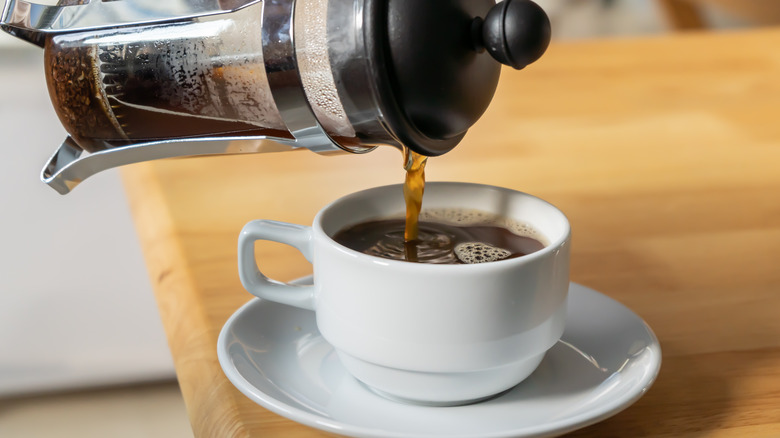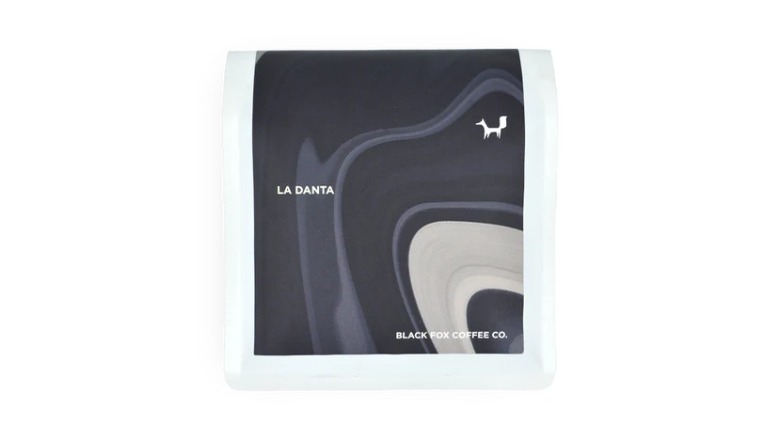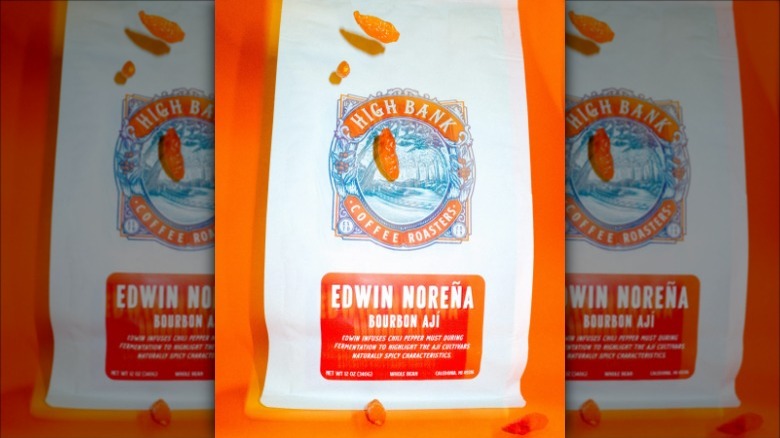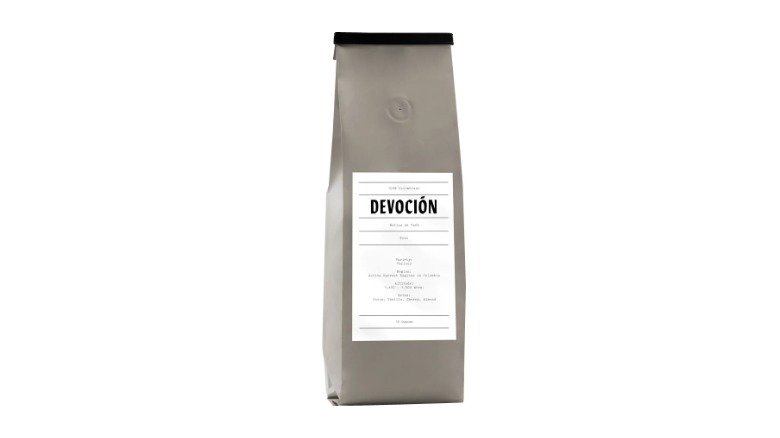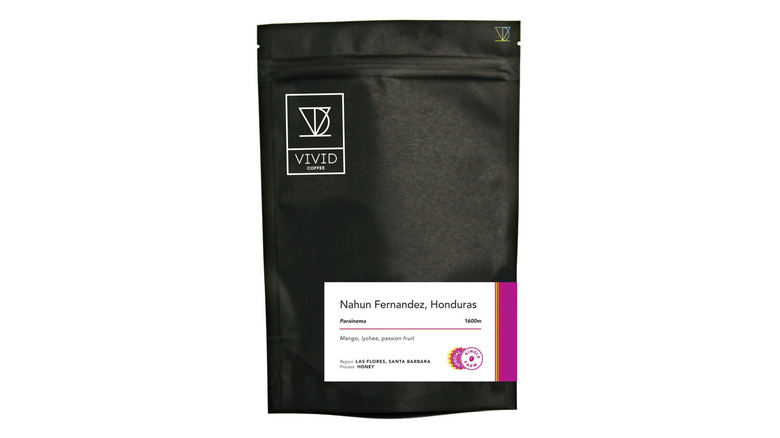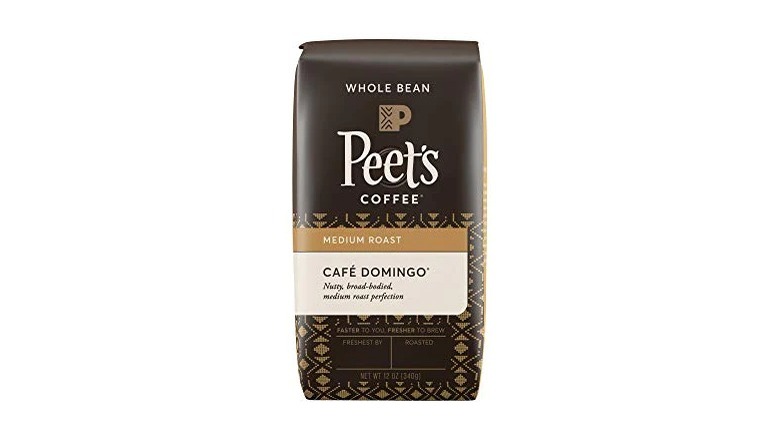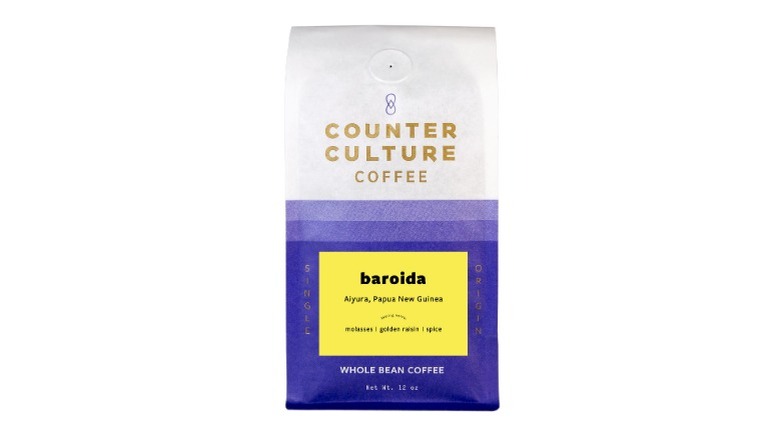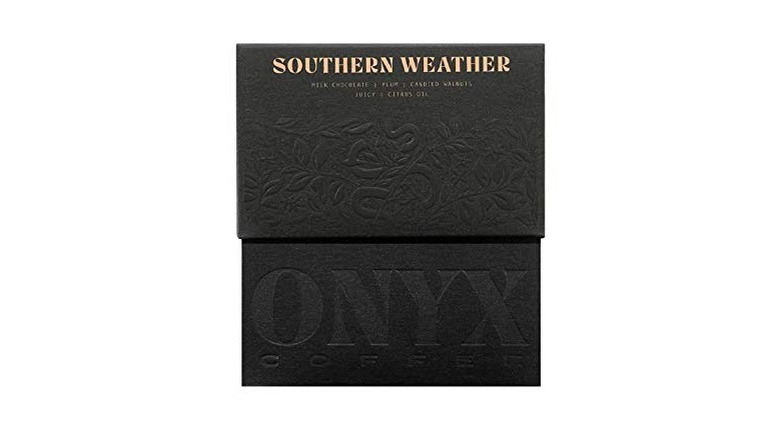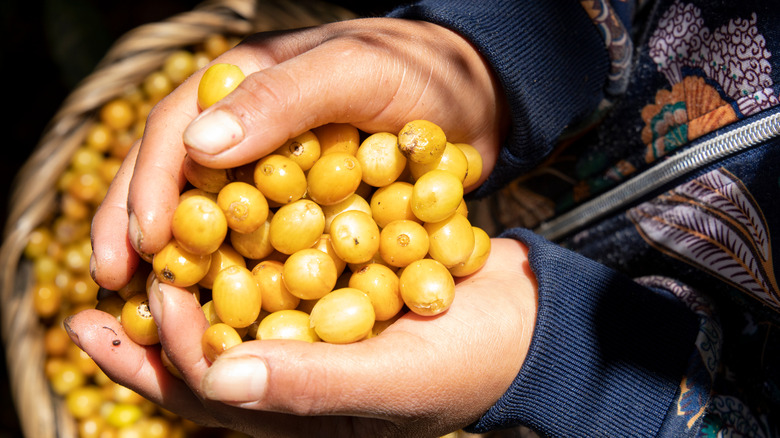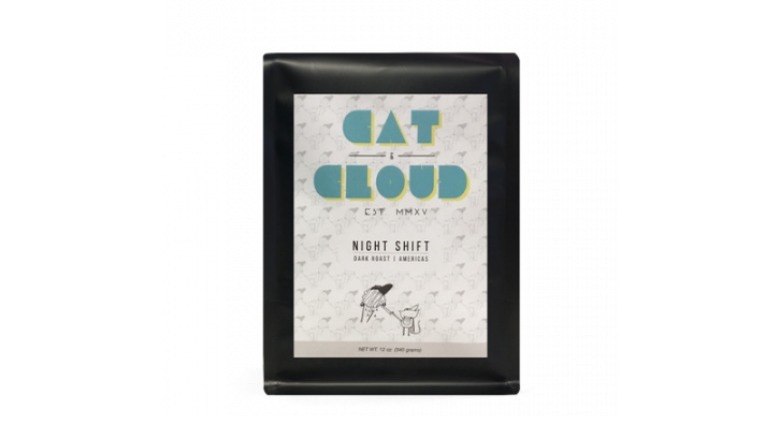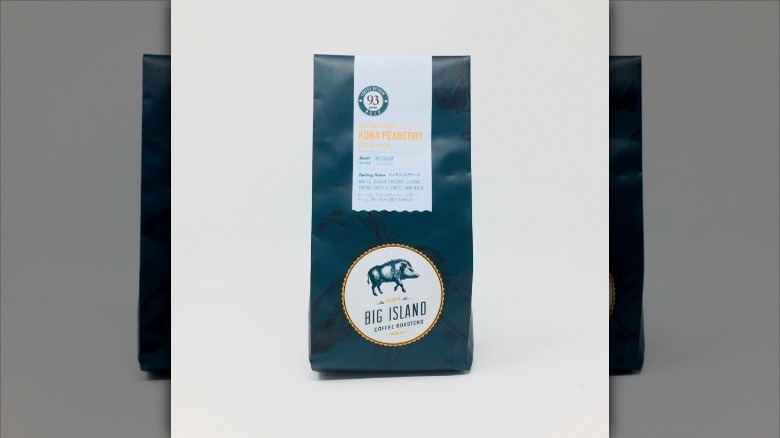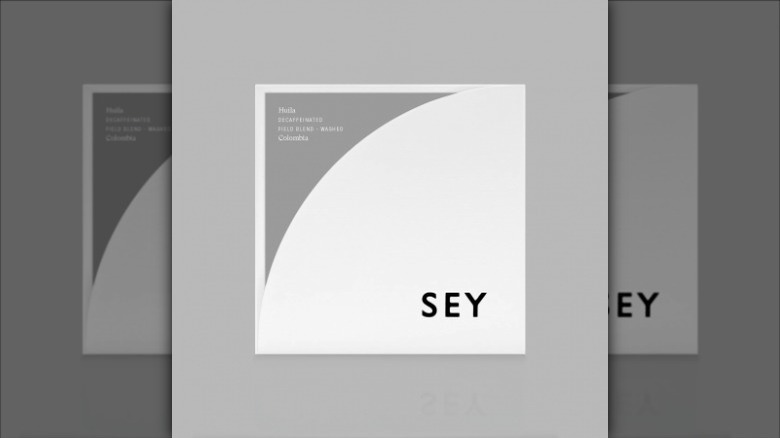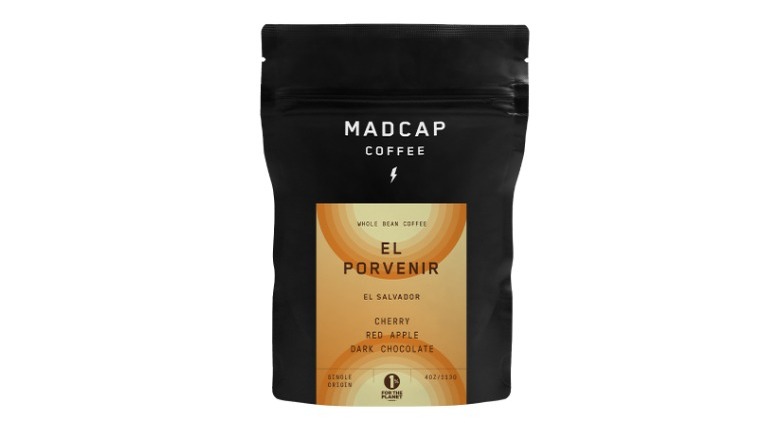The 12 Best Coffees To Use For A French Press
As The New York Times highlights, versions of the French press have been around since the 19th century. Even in this modern era of nitro brews and disposable pods, this humble piece of equipment is still holding its own. In fact, Statista reports that the French press is the third most popular method for Americans to brew coffee at home.
The French press is a simple method in which the coffee grounds have to be steeped in hot water before the plunger is dropped (via Illy). Secondly, the French press produces a unique, intense style of coffee as it extracts a lot of oil and sediment from the ground coffee (per Frankly Good Coffee).
As always, when it comes to coffee, the beans you select and how they are processed are of immense importance when using a French press. Washed coffee, for example, will taste more like the bean than the sweet fruit that surrounds it (via Rogue Wave). Naturally, with natural coffee beans, it's quite the opposite.
Furthermore, the darker the roast, the more intense and bitter the coffee will be (as per Paulig). However, it is important to remember that there is no "right" selection when it comes to coffee beans, just personal preference. If you're using a French press, there are a range of different coffee bean varieties that you can use from roasteries across the United States to brew the ideal cup of coffee.
1. Black Fox Coffee: La Danta
Black Fox Coffee is based in New York City, and it is a five-cafe mini-empire that has proved immensely successful. This is due to the exciting and high-quality range of coffees that are sold and brewed on-site.
Black Fox, as a multi-roaster (a cafe that serves coffees from several different roasters) prides itself on being at the forefront of the coffee scene and its everchanging selection of guest coffees attests to this fact.
Of course, the same demand for quality and ingenuity is demonstrated when it comes to the brand's own range of coffee beans, most notably through a blend called La Danta, which is made from Peruvian coffee bean varieties such as Caturra, Bourbon, and Typica.
This blend results in a coffee that encompasses the full range of flavors from acidic to earthy. The inclusion of both Caturra and Bourbon make this blend especially suited to the French press, as this steeping method is known to elevate both the flavor and texture of coffee produced by these beans (as per Perfect Daily Grind).
2. High Bank Coffee Roasters: Edwin Noreña Bourbon Ají
The High Bank Coffee Roasters brand is making a name for itself by selling intricate, bright coffees that feature unique flavor combinations. This particular coffee is grown by Edwin Noreña Bourbon Ají, an innovative Colombian agroindustrial engineer, and it highlights the brand's flavor-centric approach to perfection.
When drinking this coffee, expect a mind-boggling array of notes, including chili, lime, hot chocolate, and even cinnamon. The incredible amount of flavor packed into this particular coffee is due to both the variety of beans and how they are processed. The beans themselves are of the bourbon ajÍ variety, which has gained acclaim after being discovered by producer José Salazar.
High Bank Coffee Roasters reports that these beans, which already carry the spicy flavors present in the brewed cup, are infused with mossto, which is the fermented juice from the cherries of the coffee tree. This result is a spectacular product that has a unique and, quite frankly, unmatchable flavor profile, one which has to be tasted to be believed.
3. Devoción: Toro
Many coffee roasters try to set themselves apart by offering the most obscure coffee bean varieties or coming up with the loudest packaging. Devoción is not one of these roasters. Instead, Devoción has made a name for itself by being the roaster that offers the freshest coffee beans in New York City. It takes between 10 to 45 days from the moment the coffee is picked until it is roasted and ready for sale. A freshness that is truly remarkable.
Aside from keeping customers happy in the brand's four New York cafes, these ultra-fresh products are also available for purchase. One of the standout options among these is Toro, a versatile blend of Caturra and Típica (via Devoción). As Perfect Daily Grind reports, Típica, stemming from the typical plant, is a prestigious coffee variety that is known for producing sweet beverages. By mixing Típica with Caturra, Devoción has created a coffee blend that produces something exceptional when brewed with a French press.
4. Vivid Coffee: Nahun Fernandez, Honduras - Honey Parainema
Vivid Coffee lives up to its name with this coffee, which is made from the parainema variety and processed using the enticing-sounding honey method. As The Roasters Pack highlights, Parainema is well known for its savory herbal flavors. However, these have been transformed into something more akin to tropical fruit, thanks to the use of honey processing.
Contrary to what the name suggests, this processing method does not involve the inclusion of honey. Rather, the name refers to coffee that has been de-pulped but has not been washed (as per Trianon Coffee). The sweet residue of the cherry sticks to the bean. This is a substance that imparts an impressive amount of flavor.
This distinctly bright and fruity coffee may not be the most obvious choice for a French press (via Perfect Daily Grind). However, its distinctive profile makes it a coffee we simply couldn't pass up on including. Be sure to use a coarse grind and keep an eye on extraction time to ensure you get to experience the full range of citrusy and fruity flavors.
5. Peet's Coffee: Café Domingo
Not everyone wants to order their coffee from a specialty roaster. Nor do they want to trawl through pages and pages of detailed information about the coffee bean and the processes it has undergone. Instead, many people want a good, dependable coffee that is relatively cheap and easy to find. For these people, we recommend Peet's Café Domingo coffee.
Just because coffee is widely available and relatively cheap coffee should not mean you have to skimp on quality, and Peet's manages to maintain an excellent taste while being stocked nationally in major grocery stores like Target. This is largely due to the fresh nature of the beans, as each packet carries a roast date.
If you have grinding equipment at home, we would always recommend buying whole beans. However, if that is not an option, the brand carries many ground options which may be suitable (via Peet's).
When used in a French press, the medium roast of Domingo comes to the fore with amplifying flavors of chocolate and nut as well as a rich silky texture. Finally, not only does buying Peet's coffee give you affordable access to an incredible product, but it also means you are directly supporting global coffee farmers, thanks to the brand's third-party verified, responsible sourcing procedures.
6. Counter Culture: Baroida
Coffee has been growing in Papua New Guinea ever since it was introduced to the country during the colonial period. However, the incredible crop has often failed to translate into a brilliant cup of coffee: A lack of access to processing plants has often led to the fresh coffee fading or over-fermenting, which can seriously affect and alter the product's final flavor.
Fortunately, The Baroida Estate in Papua New Guinea's Eastern Highlands has taken matters into its own hands. All processes of coffee production are overseen on the estate, from the growing all the way through to the exportation.
Counter Culture is a specialty coffee roaster founded in 1995 that takes advantage of the excellent coffee that arises from The Baroida Estate. While all of Counter Culture's coffee is purchased from The Baroida Estate, Counter Culture's Baroida blend features three different varieties of coffee, and the standout one is Arusha.
HomeGrounds highlights that Arusha carries flavors of molasses, raisin, and spicy chocolate: These intense flavors are spotlighted in Counter Culture's product. What's more, Counter Culture's Baroida, as a dark and powerful coffee, is excellently suited to the French press' intense method of brewing. The resulting cup will astound you with its strength and larger-than-life flavors.
7. Onyx Coffee Lab: Southern Weather
Onyx Coffee Lab made headlines at the end of 2022 through a collaboration with NBA star Jimmy Butler (as per Arkansas Times). But don't let the association with big names fool you: Onyx coffees are about so much more than celebrity-endorsed releases, a fact that is typified by Southern Weather, the coffee Onyx Coffee Lab uses as its house filter in its cafes.
The brand states that Southern Weather was designed to have a wide appeal and approachable flavors, factors that are not always prioritized when it comes to specialty coffee. Interestingly, these flavors are kept consistent throughout the year by using beans from different locations as areas of the globe enter and exit their coffee-growing seasons.
The zest, chocolate, and candied nut-rich flavor are maintained through careful bean selection and rigorous taste tasting. Steep it in your French press to amplify those chocolatey notes and enjoy this open and friendly brew.
8. Gimmie! Coffee: Brazil Coopfam
Visual Capitalist reports that Brazil is the biggest producer of coffee in the world by far. Because of the scale of production and vastness of the country itself, there is an immense amount of diversity in Brazilian coffees (as per Perfect Daily Grind). However, the one thing a lot of Brazilian coffees have in common is the method used to process them is predominantly the natural or the pulped natural process.
This is the case for Gimme! Coffee's Brazil Coopfam, which is named for the coffee cooperative from which the beans are sourced. Coopfam is located in the southeastern state of Minas Gerais: The cooperative is well-located, as the state produces approximately half of all the coffee in Brazil (via Perfect Daily Grind).
Gimmie! Coffee draws from some 800 growers represented by Coopfam to produce Brazil Coopfam, a blend of Mundo Novo and Catuai. This choice makes perfect sense given the country's predilection for natural processing.
As Perfect Daily Grind explains, Catuai reacts especially well to natural processing. This is represented in the finished coffee, which is silky, thick, and nut-forward: These features will only be exacerbated when coffee is brewed via the French press method.
9. Cat & Cloud: Night Shift
Cat & Cloud is a Brazilian coffee brand that operates a string of four cafes and a roastery based in Santa Cruz. Night Shift coffee is made from Brazilian bourbon coffee beans alone, which are sourced from the state of Minas Geras. Cat & Cloud has doubled down and amplified the bourbon's already deep notes through a dark roasting process.
Of course, the dark roast and full-bodied nature of the coffee make Night Shift the ideal coffee to serve via the French press, as long as you enjoy strong coffee, that is. Furthermore, the direct and high-quality nature of Night Shift mirrors the ethos of the company itself. But don't expect Night Shift or any other of the coffees from Cat & Cloud to be overly simplistic.
According to co-founder Jared Truby, Night Shift coffees are fruity and complex (via Unpacking Coffee). So, be sure to expect some interesting flavors when you pour yourself a cup of Night Shift.
10. Big Island Coffee Roasters: Kona Peaberry
Big Island Coffee Roasters hails from Hawaii, and the brand has made a name for itself by producing a range of award-winning, Hawaiian-grown coffees. Chief among these is the Kona Peaberry, which is a coffee that has received an incredible 93 points from Coffee Review, with the publication lauding its rich flavors and smooth structure.
The Typica bean variety is used to make the Kona Peaberry. However, it is not the variety of the bean that sets this coffee apart, but the type: Kona Peaberry is (unsurprisingly) made entirely from peaberries. These are rounded seeds that occur in only 5 to 10 percent of all coffee cherries (as per Perfect Daily Grind).
This coffee arises from a mutation, which means only one seed grows inside the cherry instead of two, allowing the peaberries to have unfettered access to nutrients and attain an unmatched flavor.
This coffee is unique: You can expect notes of cinnamon, fruit, cacao, and perhaps even recollections of the islands. As one customer describes, this coffee is one of the best options out there, and it really gives you a wonderful taste of the islands on the mainland (via Big Island Coffee Roasters).
11. Sey Coffee: Huila
According to Murray Carpenter, an author and prominent journalist, decaffeinated coffee has long had a poor reputation, thanks in part to the product's less-than-stellar history (via Vox). Decaf has a bad reputation due to the fact that the coffee that was being made 20 or 30 years ago was not very good in terms of quality, and as a result, neither was decaf coffee. However, in the 21st century, the quality of decaffeinated coffee has improved massively; its image, not so much.
One coffee that is trying to change all that is Huila, a decaf blend of Colombian coffee beans sold by Brooklyn's Sey Coffee. This coffee is decaffeinated using a process known as ethyl acetate decaffeination which, as highlighted by Cafe Imports, is a safe, natural process that preserves the flavor of the coffee bean.
This results in the full expression of the Caturra, Colombia and Castillo beans, producing flavors such as berries and chocolate. If you want to skip the caffeine without giving up on the coffee, then Huila is the way to go.
12. Madcap Coffee: El Porvenir
Perfect Daily Grind reports that specialty coffee produced in El Salvador has a brilliant reputation that has been built upon a long history of world-class coffee production. Madcap Coffee adds to this illustrious history through its blend, El Porvenir.
Madcap Coffee is sourced from both Bourbon and Typica varieties from El Salvadorian growers known as the Rodriguez Family, who farm in the country's prestigious Apaneca region, which is an area known for its fertile lands (as per Coffee Direct).
El Porvenir, as a full-bodied coffee, will be amplified by using a French press, which is something a minority may find overwhelming (via Java Presse). However, those that like texture in their coffee will be hard-pressed to find a more suitable brew. To make matters even better, fruit flavors play an integral role in El Salvadorian coffee.
El Porvenir is no different, with Madcap Coffee highlighting red apple and cherry as potential tasting notes. As such, El Porvenir is a texture-rich, flavorful introduction to El Salvador's fabled coffee, one that will perform extremely well in your French press.
